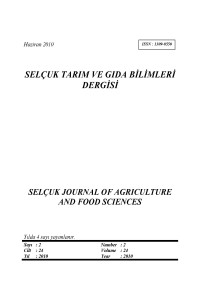Abstract
Total greenhouse area is about 49310.6 ha in Turkey. This area is one of the most important countries in green-house agriculture all over the world. However, the level of yield and quality in greenhouse crops is not enough. The mean reason of these must not been kept at the desired level of the climate of greenhouse in general. The biggest deficiency in the greenhouses ecology is the deficiency in heat value. Heating costs in greenhouse are generally very high in Turkey that has almost 50-80% in total production costs of greenhouses. Therefore, most farmers have used anti-frost greenhouses in vegetable crop production. Under cold climate conditions, the tolerance level of vegetables has de-creased the biotic and abiotic stress factors, so yield and quality of crops reduce. To improve the yield and quality, higher fertilizers, pesticides and plant growth regulators have to be used by farmers. By heating the greenhouses with geothermal water, friendship of environment, both yield and quality of the crops are improved while also residual problems of crops associated from all chemical applications reduce. The geothermal water supply is very rich in Turkey (more than 3000 water supplies) and one of the most economical sources in heating the greenhouses. In this paper, therefore, the geothermal water potential of Turkey and possibly of its uses and effect of heating the greenhouses by geothermal water sources on yield and quality of vegetable crops were researched. In addition, the importance of geothermal water for suitable crops human health and sustainable environment were studied.
Abstract
Türkiye’de toplam sera alanı 49310,6 ha’dır. Bu alan ile bütün dünyada sera tarımında önemli gelişmiş ülkelerden biridir. Ancak, sera üretimindeki verim ve kalite yeterli değildir. Bunun ana nedeni genellikle sera ikliminin istenen düzeyde tutulamamasıdır. Sera ekolojisindeki en büyük eksiklik ısıtmanın yeterli olmamasıdır. Türkiye’de genellikle seralarda ısıtma maliyetleri çok yüksek olup toplam üretim maliyetlerinin %50-80’ni ısıtma oluşturmaktadır. Bu yüzden pek çok çiftçi sebze yetiştirirken anti-frost seracılık (dondan koruma seracılığı) yapmaktadır. Dondan koruma seracılığında sebzelerin abiotik ve biotic stress faktörlerine dayanımı azalmakta, verim ve kalite düşmektedir. Verim ve kaliteyi artırmak için, seralarda çiftçiler tarafından daha fazla gübre, pesisit ve bitki büyüme düzenleyici kullanılmaktadır.
Seraların jeotermal akışkanlarla ısıtılmasıyla, çevreye dost üretim yapılmakta, kimyasal uygulamalarında kaynaklanan kalıntı sorunları azalmakta ve verim ve kalite artmaktadır. Türkiye’de jeotermal su rezervleri çok yüksektir (3000’den fazla) ve sera ısıtmasında en ekonomik kaynaklardan biridir. Bu nedenle bu çalışmada Türkiye’nin jeotermal su potansiyeli, sera ısıtmasında kullanılabilirliği ve jeotermal enerji ile ısıtılan seralarda sebze üretiminde verim ve kaliteye etkileri araştırılmıştır. İlave olarak insan sağlığına uygun üretim ve sürdürülebilir çevre için jeotermal suyun önemi üzerinde durulmuştur.
Details
| Primary Language | English |
|---|---|
| Subjects | Horticultural Production |
| Journal Section | Review Articles |
| Authors | |
| Publication Date | June 25, 2010 |
| Submission Date | January 1, 2010 |
| Published in Issue | Year 2010 Volume: 24 Issue: 2 |
Selcuk Agricultural and Food Sciences is licensed under a Creative Commons Attribution-NonCommercial 4.0 International License (CC BY NC).


